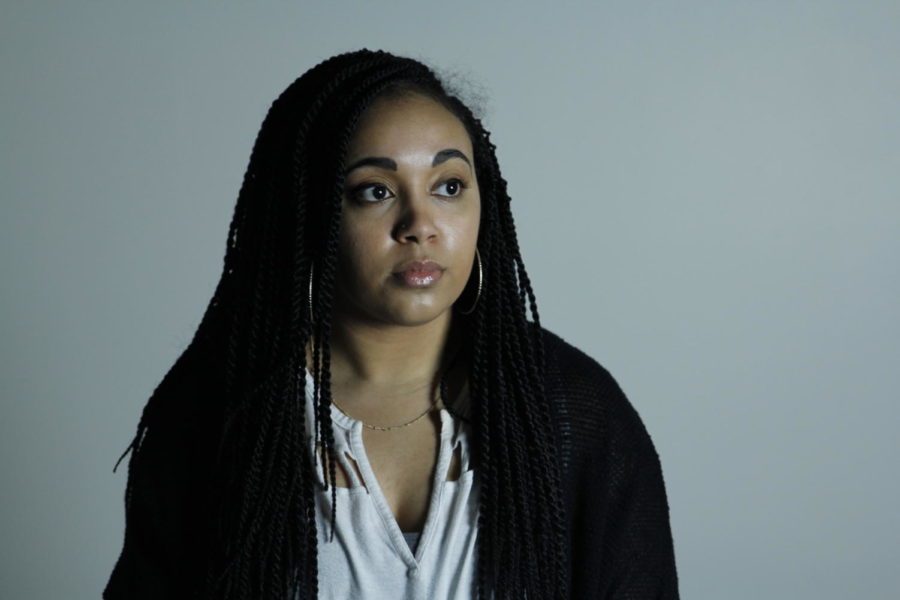- App Content
- App Content / News
- News
- News / Politics And Administration
- News / Politics And Administration / City
- News / Politics And Administration / State
In this together: Overcoming barriers
Chris Jorgensen/Iowa State Daily
Brittany Pernell, a senior in child, family and adult services, shares her story as a sexual assault survivor.
February 27, 2017
Trigger warning: This content uses language that may trigger sexual assault survivors.
Sexual assault is a complex and horrible issue. It is personal, it is heartbreaking and it is different in every case. But if we ever want to put an end to sexual assault, we have to stop letting its complexity get in our way.
This is the seventh story in a semester-long series where the Daily will publish a multitude of stories related to sexual assault, including discussions about various resources survivors can obtain if they are comfortable doing so.
— Emily Barske, editor in chief
It happened the summer before her freshman year of college.
Brittany Pernell was at a party hosted by her ex-boyfriend. They had broken up months before and hadn’t spoken since, but her friends wanted to go. They urged her to come along and clear the air so they all could have a good time.
Pernell agreed but on one condition: she had to be drunk.
“I had never drank before, so in turn, I’d never been drunk before,” Pernell said. “On our way to the party I was drinking. When we got to the party I was drinking. I remember everything when we got to the party. I remember the layout of the house and the people who were there and whatnot. And of course he was there.”
When they arrived, she spoke with him. As the night went on, Pernell said she became sloppy and belligerent. Other partygoers told Pernell’s ex to “get her” as it became clear she was drinking too much.
“I don’t know why his interpretation was ‘get her and take her to a bedroom,’” Pernell said.
Beyond this point, Pernell can’t remember what happened. She was too drunk. But when her friend returned to the party from a booze run, no one could tell her where Pernell was. She searched bedroom after bedroom until she came upon a locked door. Behind it was Pernell and her ex.
“She asked him to open the door and he wouldn’t,” Pernell said. “Once I did come out, we left immediately afterward. I had to ask her the next day what happened.”
At first, Pernell wasn’t sure if she was raped. They were both drunk, they had dated before, perhaps she was into it. Perhaps he couldn’t tell the difference.
The next day she approached him. He told her he couldn’t remember what had happened. But a week or so later, the two were speaking on the phone.
As she questioned him about the party, one sentence confirmed to Pernell that she had indeed been sexually assaulted.
“There was some point in the conversation where he told me that ‘if he wouldn’t have done it, somebody else would have,’” Pernell said. “After that conversation, I completely cut him off.”
As for the friends who pressured her to go the party, some believed her, some did not.
A month later, Pernell moved to Ames and began her freshman year at Iowa State, but the actions of her perpetrator would haunt her as she tried to adapt to college life.
She began to withdraw from her friends. She refused to seek help. And though she branched out and made friends in her residence hall, that was the extent of her social experience.
“Freshman year I attempted suicide by trying to overdose,” Pernell said. “My roommate had to wake me up because it wasn’t enough to do it, but it was enough that I was knocked out. I was really against going to get help. I did not want to go to a counselor, I didn’t want to be put on medication. Essentially I was trying to deal with it on my own.”
While her mental health deteriorated, her academics suffered too. By the end of her first semester, she was on academic warning. By the end of her second semester, she was on probation. By the end of her third, she was dismissed.
Pernell attributes it all to that one night. To that one party.
“I was not like this before it happened,” Pernell said.
Every sexual assault survivor’s experience is different; however, there are some common elements. Alcohol. Manipulation. Mental health problems. Absence of consent.
Yet, for Pernell and many others, the color of their skin and the way in which they self-identify adds new barriers to the already complex issue of sexual assault.
Pernell is an African-American woman, and, according to the Women of Color Network, for every African-American woman who reports being sexually assaulted, there are 15 who don’t.
Underrepresented: Barriers in Communities of Color
Sexual assault, and the mental health problems it brings about, aren’t topics open for discussion in many black communities. Oftentimes, victims cannot find support within their families and friend groups. They don’t go to the police because they don’t trust law enforcement. They’re told to “stop being dramatic” or to simply “pray about it,” Pernell said.
“Especially, especially, especially in the black community, there’s a huge stigma of admitting to sexual assault and admitting to having mental health issues,” Pernell said.
Vanessa McNeal, a sexual assault survivor who works as a public speaker and filmmaker focusing on sexual assault, said that higher rates of childhood sexual assault, coupled with a distrust in law enforcement and rampant homophobia creates a “culture of silence” that hurts victims.
“I know for sure in the black communities that when there’s survivors of sexual violence they’re less likely to report to the police,” McNeal said. “And that’s just because of a distrust and disconnect that they have with law enforcement and the system in general because systematically, minorities, especially African-Americans, are continuously abused by the system.”
McNeal said the lack of reporting is an even worse issue when it comes to black men. Families in black communities may respond differently to male victims because they worry that the sexual violence will make them gay.
“In black culture, it’s really frowned upon to be gay,” McNeal said. “So it just perpetuates more silence.”
But McNeal also noted that the resilience in the coping styles of black families can be a point of strength for victims, depending on how a family responds to the abuse.
“As long as they’re nurtured and they’re met with statements about being believed and being protected, then their recovery will look different as opposed to being met with ‘well, you might be gay’ or ‘let’s not talk about this’ or ‘it’s not a big deal,’” McNeal said.
McNeal attributes much of the violence, both sexual and non-sexual, to the high poverty rates within black communities. At the same time, the rift between law enforcement and black communities, as well as high-profile cases like that of Brock Turner, discourage victims from reporting.
When victims don’t report, perpetrators aren’t prosecuted. When perpetrators aren’t prosecuted, victims don’t feel that their report will mean anything.
Underrepresented: Barriers in the LGBT Community
Skin color isn’t the only barrier that sexual assault victims in underrepresented demographics face. For those in the LGBT community, studies show that they may have an increased risk of sexual assault on a national scale. Here at Iowa State, it’s no different.
In 2015, Iowa State University published a campus climate survey on sexual assault and sexual misconduct. The study looks at, among other things, the frequency and prevalence of sexual misconduct on students at Iowa State.
It found that sexual assault among non-heterosexual men and women was more than twice as prevalent as it was for heterosexual men and women.
The study showed that when it came to non-consensual penetration, non-heterosexual individuals had a prevalence rate of 20.8 percent, compared to 8.8 percent for heterosexual individuals.
For sexual assault or misconduct due to an absence of affirmative consent, non-heterosexual females showed a rate of 14.6 percent, compared to 8.9 percent in heterosexual females. Non-heterosexual men experienced a rate of 7.7 percent, compared to 1 percent in heterosexual men.
For transgender individuals, distrust became a common motif in the report. The study defined the population as transgender, genderqueer, non-conforming or questioning (TGQN).
It found that overall, fewer TGQN students believed that university officials would take a report of a sexual assault seriously. Furthermore, fewer TGQN students believed that the university would protect them, conduct a fair investigation or take action against the offender.
TGQN students also suspected that they had friends who had been victims in higher proportions.
Margo Foreman, director of equal opportunities at Iowa State, believes that what the study showed is reflective of the nation as a whole.
“I believe it’s represented of the nation conversations,” Foreman said. “[It’s] definitely not a surprise. When I look at this through the compliance piece and I look at it relative to how other issues of conflict and concern are raised, this aligns with what we are seeing.”
Foreman said that in addition to students of color, she believes LGBT students often feel less safe when it comes to reporting sexual assaults. She also believes that self-blame and victim blaming often discourage students from seeking help.
“We’ve got more vulnerability and then less reporting or feeling less safe to report those issues based on already having some marginalized identities and how they perceive help,” Foreman said. “So I am not sure that they feel safe to report.”
Overcoming
For all marginalized groups, the intersectionality among skin color, poverty, sexual orientation and life experiences can be the building blocks of the barriers that keep them from seeking help.
However, as it is with all problems, the first step to a solution is acknowledgment. When it comes to sexual assault, that acknowledgment comes from reporting.
ISU Police officer Anthony Greiter, the department’s community outreach specialist as well as a member of the Story County Sexual Assault Response Team (SART), said that the first step, which is sometimes the hardest, is getting in the door.
“With underrepresented grounds, probably the biggest barrier that I imagine exist is getting in the door,” Greiter said. “That’s a personal decision that I can respect, and it’s something we work to overcome.”
Greiter cited SART’s Start by Believing approach as a way to encourage more victims to report.
“That approach that spans everyone that we work with is victim centered,” Greiter said. “So when a victim comes in to report they’ve been sexually assaulted, the first thing is that they’re going to be believed. We start by believing here. It’s not a blind belief, but it allows us the opportunity to have a conversation and collect information and collect evidence.”
ISUPD also has a liaison that works closely with LGBT Student Services to increase student awareness about services that exist on campus. Greiter said that because of this, they have seen an increase in LGBT students coming forward and reporting.
Greiter also said that a variety of individuals within ISU PD have reviewed parts of the campus climate survey. For the department, the distrust that many TGQN students have in the university showed yet another area for improvement.
“I would bring that right back to the Start by Believing Campaign,” Greiter said. “I think we need to focus our efforts on those communities that have the impression that they won’t be believed, which is most communities.”
For Greiter, McNeal and Foreman, an increase in reported sexual assaults is a good thing. At least for now.
“When I talk about numbers, though, numbers are rising everywhere, as they should be,” Foreman said. “Reports should be rising because we’re educating people. But they shouldn’t keep rising.”
Lupita Aquino, diverse populations sexual assault victims advocate for Assault Care Center Extending Shelter and Support (ACCESS), said that past experiences with organizations that lack proper training can also act as a barrier for many who seek help.
“Social agencies that would be helping some of these populations have not had maybe the training in how to assist those populations,” Aquino said. “Therefore, that past experience kind of makes it difficult for people to feel like, ‘OK, let me reach out to this service and maybe I’ll have a different experience.’”
However, Iowa State is trying to increase trust and reporting among students, but that is not an easy task.
“It’s moving a big rock uphill,” Foreman said. “What we’ve done is examine the climate survey and a piece of the puzzle, not the whole piece, but a piece of the puzzle. And what we find is probably the gaps are the prevention pieces.”
In her time as EOO director, Foreman has put in place additional deputy Title IX coordinators, opened up the conversations in orientations for faculty staff and students earlier in the year and has worked to expand the awareness of services on campus.
She defines the line between policy and practice, saying that the necessity of community outreach in addition to the nuances from case to case will always be more focused in practice, rather than policy.
Now, Foreman hopes to use this year to “brand” some of the initiatives her office has started.
“What does a Cyclone look like under this context? How do we involve everyone feeling like they are a Cyclone in this context? We don’t want people to drop out,” Foreman said.
Healing
Pernell’s experience doesn’t end with her dismissal.
After leaving Iowa State, she enrolled at DMACC. Her current boyfriend encouraged her to seek help, and she eventually saw a counselor at Student Counseling Services at Iowa State.
She made the dean’s list during her first semester at DMACC and was able to re-enroll at Iowa State shortly after. Pernell is now a senior in child, adult and family services. She’s been on the dean’s list for the last four semesters.
Pernell said McNeal played a large part in her decision to tell her story. She said she sees sexual assault in general as an issue that the black community needs to address.
McNeal said that, when discussing sexual assault, there is a quote she always falls back on:
Start being comfortable with the things that are uncomfortable, and become being uncomfortable with the things that are comfortable.
“What that means is that this conversation is really difficult to talk about but it’s really important,” McNeal said. “We need to start being uncomfortable with the fact that we perpetuate sexual violence. We live in a rape culture, and that’s comfortable with us now.”







